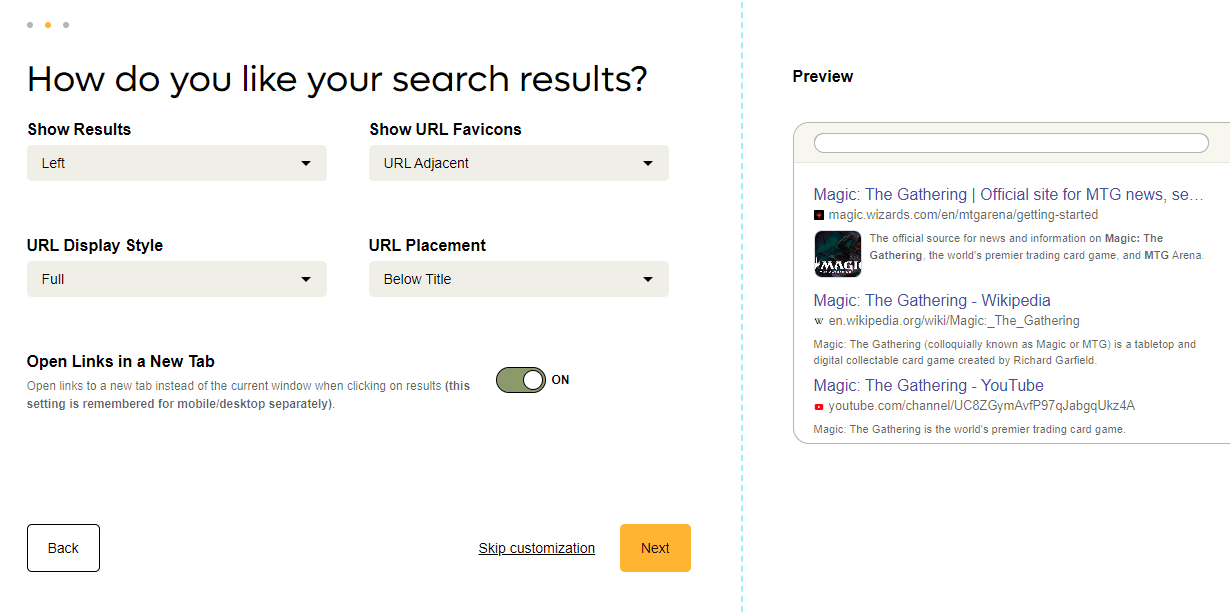Presented timidly at the end of March 2023, Go ahead is a Web platform that was born after years of development, driven by the work of the technicians of the Californian company of the same name. Today the project is still growing, as evidenced by the updated changelog, and aims to present itself as a concrete alternative to Google Search. The “core” of Kagi lies in the search engine for the Web although the developers have added a map system, a mechanism for creating a summary of texts published online, a chatbot (called FastGPT) which recalls the functioning of ChatGPT, a browser Web and much more.
Kagi as an alternative search engine
Global search engine usage data appears to leave little room for competitors. In Europe, as in Western countries in general, Google Search is the absolute dominator. GlobalStats data updated to September 2023 sees 82% of European users using Google; around 9% Bing. Minimum shares are the prerogative of other lesser-known names.
The creators of Kagi are instead convinced that there is still room to establish itself in the smartphone segment online searches. Theirs is a product that, if we were talking about pure software, we would call it freemium: the Kagi platform allows you to carry out free 100 web searches and then request the activation of a monthly subscription plan, starting from 5 dollars (10 dollars for an unlimited number of searches).
But search engines are not free? Yes. But it is not an axiom written in stone. The companies that offer the best known search engine they base their business on advertising revenues and information shared by users, which can be used for commercial and marketing purposes. The authors of Kagi did the math in Google’s pocket, estimating that, on average, each user who uses the web search service brings almost 300 dollars into Google’s coffers (for a total of 76 billion dollars in the USA alone).
Il business model of Kagi is therefore clearly different: the platform does not collect any user data, does not use any information linked to online searches, does not show adverts of any kind, not even on the SERP pages. In light of all this, the payment of a variable monthly fee is required, depending on how much the service is used.
What is Kagi and how does it work
The quality of a search engine depends on how long it takes to obtain satisfactory results, how complicated the path to reach those results is and the user experience encountered when using the service. Most of the search queries fall into one of the following categories:
- Instructions (e.g. recipes, how to do something, coding tips,…)
- Events (i.e. past or current news)
- Facts (duration of a film, age of a famous person, date of a historical fact,…)
- Solution (advice on a methodology or product to use)
- Exploration (research, information to enrich your cultural background, to plan a trip,…)
A search had success when the user manages to find a piece of information or a reference that satisfies the original query. The more steps it takes to reach the final goal, the worse the search engine quality.
Which sources does Kagi query to provide satisfactory search results
Kagi does not reveal his “secret recipe” but simply states that to compose the SERP pages and therefore answer questions of users, use a search client capable in turn of drawing on the information gathered from crawler of the service and to connect to various indices and sources. As for external sources, Kagi sends anonymized API calls also to Google, Mojeek and Yandex as well as specialized engines such as Marginalia and to vertical sources such as Apple, Wikipedia, Open Meteo and so on.
Each search on Kagi usually calls on a variable number of sources simultaneously, with the aim of returning to users the better search results possible. Obviously, the “contacted” sources are different depending on the specific user search: think of images and news, for example.
The search indexes managed by Kagi
However, a search engine like Kagi also relies on its own Web index called Teclis and a news index (TinyGem). The Indicia di Kagi They also provide unique results that help you discover non-commercial websites and small online discussions that are nevertheless particularly compelling on a particular topic. The indexes Teclis e TinyGem they are both available and accessible via API.
The authors of Kagi also launched the initiative Kagi Small Web which collects content from personal blogs and web discussions.”Discovering high-quality content written on a non-profit basis gives Kagi’s search results a unique flavor and makes it feel more human to use“, they explain.
Despite all this, Kagi also draws on a wide range of niche sourcessuitable for providing useful answers for very specific topics.
By acting on the settings, Kagi also allows you to customize the engine search and change the “look” of the SERPs. For example, you can choose the light or dark theme, how to align the results, decide whether to show website icons (favicon), the positioning and styling of URLs.
Kagi also gives users back the power to pick up in the ranking the web pages they deserve and, vice versa, contribute to “sinking” sites that share very poor quality content.
How to try Universal Summarizer and FastGPT
In addition to the search engine itself, it is interesting to test Universal Summarizer, a tool that is capable of creating a summary of the content of any page, possibly highlighting the main points. By clicking on the button Discuss further, you can interact with Kagi’s artificial intelligence to ask further questions on the topics covered and obtain relevant answers. It is important to remember to choose Europen as the output language.
In this regard, Kagi also proposes FastGPT, a chatbot which answers users’ questions, in natural language and Europen, in ChatGPT style.
But what does Kagi mean? Simply key, in Japanese. And it is pronounced kah-gee.


